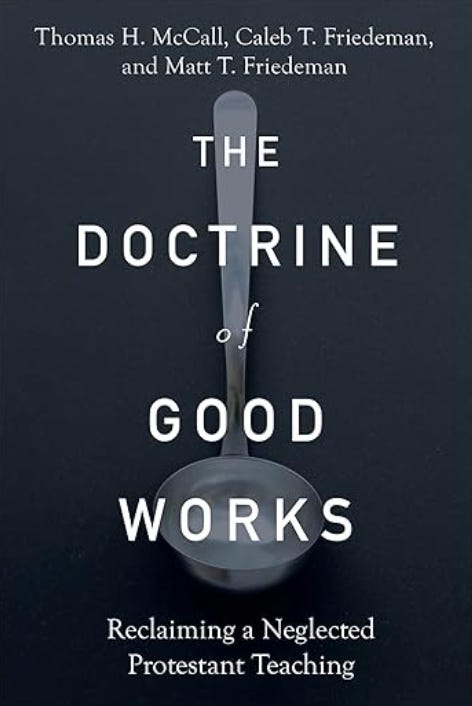Jesus-like Good Works
One might be surprised how important good works are in the Book of Acts. So far, in the book by Thomas McCall, Caleb Friedemann, and Matt Friedemann (=MFF), The Doctrine of Good Works: Reclaiming a Neglected Protestant Teaching, this rather short section on the Book of Acts has been a real highlight for me. They offer a paradigm for exploring the parallels between the good works of Jesus and the good works of the early church.
Begin with this: “In the first book, Theophilus, I wrote about all that Jesus began to do and teach” (Acts 1:1). Most of those who study Acts we'll give attention to the words “began to do and teach” because it suggests, and even more states, that what Jesus began to do in the Gospel of Luke he continues to do through his disciples in the early church. One could say then that by studying the behaviors and practices of the earliest Christians one catches glimpses of what it means to continue to do the works of Jesus. Not that everything the early church did constitutes continued acts of Jesus.
The secret sauce of understanding how the early churches practices continue the work of Jesus, can be found in Acts 1:8: “But you will receive power when the Holy Spirit has come upon you, and you will be my witnesses in Jerusalem, in all Judea and Samaria, and to the ends of the earth.” Which is to say that insofar as believers are empowered by the Holy Spirit they have the capacity to do the works of Jesus in our world today. This sets the reader of the Book of Acts free to explore early church practices as instances of Spirit-empowered acts of Jesus.
Furthermore, “just as the Spirit came upon Mary to conceive Jesus, a new Adam, the Spirit now comes upon Jesus’s disciples to conceive the church, a group of people who will (like Jesus) manifest a new way of being human” (all italics in original). In the power of the Spirit the early Christians become living witnesses of Jesus, which is to say they are empowered to continue to do the works of Jesus in our world.
Notice the following practices/acts/doings of the early church and notice how each has parallels in the practices/acts/doings of Jesus in the Gospel of Luke. (I give but one or two examples but the examples can be filled out by you.)
Prayer: Acts 2:42; Luke 11:1-4
Breaking of bread: Acts 2:42, 46; cf. Luke 15:1; 22:14-23 and table fellowship stories
Preaching: Acts 5:42; cf. Luke 4:16-30
Signs and wonders: Acts 2:43; cf. Luke 4:38-41
Healing the sick: Acts 5:15-16; cf. Luke 6:17-19
Casting out demons: Acts 8:6-7; cf. Luke 8:26-39
Sharing possessions: Acts 2:44-45; cf. Luke 9:1-6; 12:33-34
Providing for widows: Acts 6:1-7; Luke 4:25; 20:47
What do you see?
The paradigmatic passage for the ministry of Jesus is Luke 4:18-19. Here Jesus quotes the prophet Isaiah, invoking the Jubilee passage from the book of Leviticus, revealing to his hometown audience that his fundamental mission is the liberation connected to Jubilee. And does not the gift of the Holy Spirit unbelievers propel them into a similar Jubilee-shaped vision for the ministry of the church today?
Most of us will admit that far too much of church ministry is consumed with gathering and administrating the organization, along with upkeep of the building and facilities.
What would happen to our churches if we took Acts 1:1 seriously enough to see it wrapped up in the jubilee-shaped kingdom vision of Jesus as the paradigm for what the church is called to do in its local community?
Next week, Paul and good works.




“What would happen to our churches if we took Acts 1:1 seriously enough to see it wrapped up in the jubilee-shaped kingdom vision of Jesus as the paradigm for what the church is called to do in its local community?”
What a great question, that should lead us onward with the true joy of Jubilee!
“Amazing Grace, my chains are gone!
Amen! May it be so!
That’s been my prayer for sometime now.